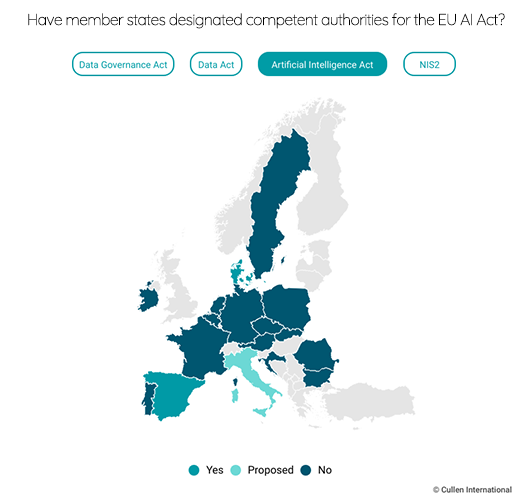We just updated our Benchmark on national competent authorities that were or could be empowered to enforce the Data Governance Act (DGA), the Data Act, the Artificial Intelligence Act (AIA) and the directive on measures for a high common level of cybersecurity across the EU (NIS2) in 17 EU countries.
National authorities will oversee the application of these new EU rules. An exception is the supervision of general-purpose AI models, which was entrusted to the newly created AI Office in the European Commission.
The research shows that in general member states are still at an early stage of the designation of competent authorities for the Data Act and the AI Act, while they are moving forward with the implementation of the DGA and the transposition of the NIS2 Directive.

The research shows that:
- On the DGA, most of the surveyed member states have not yet designated competent authorities to enforce different aspects of the act, while the regulation applies since September 2023.
- On the Data Act, France was the only surveyed country which designated a competent authority (the telecoms regulator, ARCEP is responsible for enforcing the provisions related to cloud services).
- For the AI Act, only Denmark and Spain appointed their competent authorities, government agencies in both cases.
- On NIS2, Belgium and Croatia, the only surveyed countries that transposed the directive, designated a national or central cybersecurity authority. Howeever, telecoms regulators (BIPT and HAKOM respectively) will be competent for providers of electronic communications services (ECS).
For more information and to access the full benchmark, please click on “Access the full content” - or on “Request Access”, in case you are not subscribed to our European Digital Economy service.
more news
19 December 25
CSRD transposition: Belgium, Denmark, Finland and Slovenia transpose the “stop-the-clock” directive
Cullen International’s updated benchmark tracks the progress made by the 27 EU member states in transposing the CSRD and the related “stop-the-clock” directive.
19 December 25
Global trends in AI regulation
Our latest Global Trends benchmark compares policies and regulations on artificial intelligence (AI) across 14 jurisdictions around the world.
19 December 25
Implementation of European Media Freedom Act: general overview in 12 EU member states
Our new Media benchmark shows if there are initiatives/rules in the selected countries which aim to put into application the EU Media Freedom Act (EMFA). If yes, it describes the scope of the main measures proposed. The benchmark also provides information on the next legislative or regulatory steps.